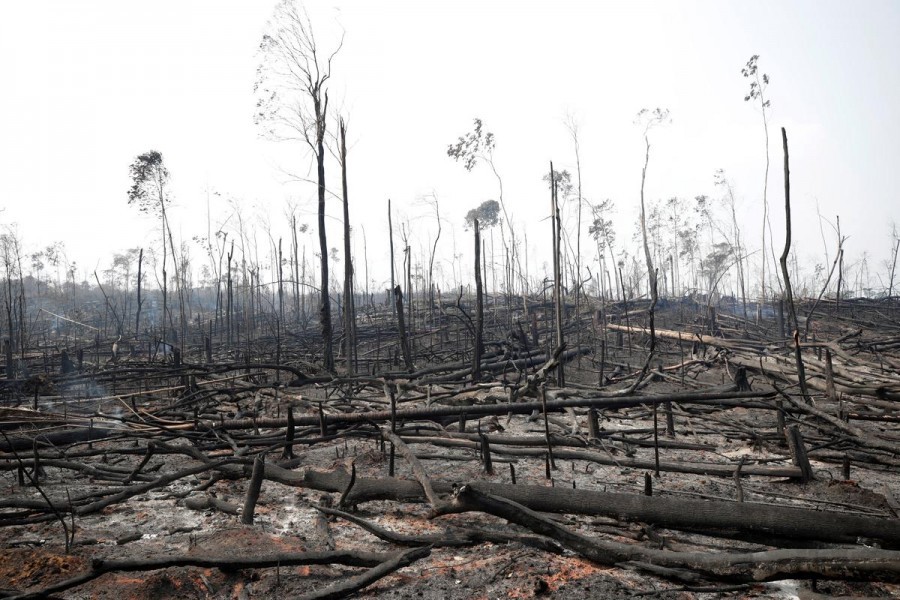The footage broadcast by a foreign TV news channel a couple of days ago contained some horrid images. A few were awfully troubling. Apart from the raging forest fire and burnt-out trees and bushes, there were outlines of deer and other similar animals which seemed to have been made with ashes. They looked like cave paintings. A few rabbits were seen in a frozen position. It looked as if they got stuck in zero degree Celsius; the cuddly animals were sitting on the ground --- dead and still. Their furry bodies bore marks of deep burn. These and many such views showed the incredible extent of havoc wrought in the last eight months with the Amazon rainforest, the world's largest, by illegal loggers; miners and dairy farm owners. After the start of the inferno this year, an expanse of 3,44,500 hectares of the forest, out of an area of total 2.1 million square miles, caught a mysteriously prolonged wildfire. Local biodiversity activists blame forest-destruction syndicates for this year's conflagration. Wildfire is common in Amazon rainforest. But the fire in the Brazil segment this year is unprecedented. Around 75,000 incidents of fire occurred in last 8 (eight) months in the Brazil segment of the rainforest. A total of 9 (nine) countries in South America cover the forest.
Although called the 'lung of the world', the insatiably greedy mankind could not have found a more ideal venue for replacing its vast segments with profit-churning enterprises. Brazil's 8-month-old government of President Jair Bolsonaro calls the new administration a 'pro-business' one. Apparently, the president's policy clashes with global interest --- the environmental benefits offered by the rainforest. Bolsonaro's critics define the blaze as part of this policy. Reaping land-related and economic benefits from the ouster of native peoples from their ancestral areas has long been in practice. A section of people have resorted to it since the dawn of civilisations. History has records of following such principles of self-aggrandisement through the ages. In different times, different nations drew the ire of the outside world for destroying pristine woodlands, wildlife and indigenous people's habitats for their material benefits. This time, the Brazilian administration of President Jair Bolsonaro has turned out to be at fault. At least in the international domain. The natives of the Americas, Canada, Australia and New Zealand, as well as parts of Sub-Saharan Africa, met the similar fate 200 to 500 years ago. Today's world feels embarrassed to recall those days of wholesale wiping out of invaluable forests, peoples living there and their cultures.
In the 21st century, the vast and magnificent Amazon forest --- Brazil owning 60 per cent of it, remains an impressive and awe-inspiring remnant of the Earth's sylvan past. The largest forest in the present-day world is home to around three million species of plants and wildlife, and some 1 (one) million indigenous people. Several communities of them live in the deep areas of the forest. There are pockets where the natives are said to have been living since prehistoric times. They love to be left alone, cut off from the outside world, and do not welcome outsiders. These ancient inhabitants practise the rites and rituals passed down on to them by their forefathers. A clear picture of these vulnerable people has yet to come out. However, there have been rallies in the Brazilian city of Sao Paulo on demands for protection of the forest's indigenous communities after the blaze started.
That the continued fires ravaging the Amazon rainforest will trigger protests worldwide is natural. The forest plays a critical role in maintaining global ecosystem. It absorbs a quarter of the 2.4 billion metric tonnes of carbon of the total sucked in annually by all forests on the Earth. The most vital aspect of the forest is it releases 20 per cent of global oxygen. This fact has earned the Amazon rainforest the sobriquet of the 'lung of the world'.
The segment most benefited from the near-apocalyptic fire is said to be the farmers, who follow the slash-and-burn technique to grow crops and produce dairy products in the forest. They are unfalteringly united in supporting the 'pro-business' stance taken by the government of President Bolsonaro. The fast spreading fires already devoured 18,627 square kilometres of Brazil's Amazon region this year till August. What is most alarming, clouds of smoke mixed with soot have fanned out across the human settlements situated even in the far-away areas. In this gleeful orgy of destroying the Amazon forest, illegal miners and loggers have played a leading role also earlier. Others joined later. According to local conservationists, it is the illegal miners and loggers who have started the process.
With the Brazilian president declaring his unambiguous 'pro-business' policy and attacking the excessive emphasis on environment, his position among the conservationists has been badly tarnished. But it has not occurred in Brazil itself. Few important voices have been heard that clearly disapproves of the president's action. It is the international forums, including the recently held G-7 meet, which have come down hard on President Bolsonaro's negative position on the Amazon rainforest. It was especially the French President Emmanuel Macron who has taken the Amazon fire issue quite seriously, comparing it with "an international crisis". Meanwhile, protests against the Amazon blaze continue to spread around the world, in Europe in particular. In a fresh development, Brazilian activists have at long last started focusing on the Amazon fire. Throughout the last week, environmentalists organised rallies in nearly 50 cities in the country. These demonstrations echoed the cries of "Bolsonaro Out!" heard in the cities of Barcelona, London, Paris and some other European cities.


